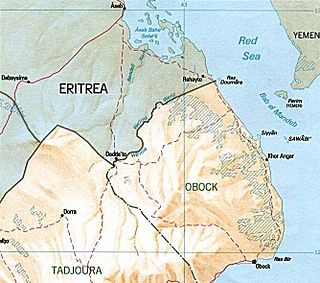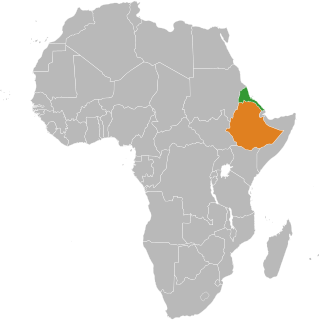| |||||
| Decades: | |||||
|---|---|---|---|---|---|
| See also: | Other events of 1998 Timeline of Eritrean history | ||||
Events in the year 1998 in Eritrea .
| |||||
| Decades: | |||||
|---|---|---|---|---|---|
| See also: | Other events of 1998 Timeline of Eritrean history | ||||
Events in the year 1998 in Eritrea .

"Eritrea" is an ancient name, associated in the past with its Greek form Erythraia, Ἐρυθραία, and its derived Latin form Erythræa. This name relates to that of the Red Sea, then called the Erythræan Sea, from the Greek for "red", ἐρυθρός, erythros. The Italians created the colony of Eritrea in the 19th century around Asmara, and named it with its current name. After World War II, Eritrea was annexed to Ethiopia. In 1991, the communist Ethiopian government was toppled by TPLF and Eritrean forces and earned their independence. Eritrea officially celebrated its 1st anniversary of independence on May 24, 1994.

The Eritrean–Ethiopian War, also known as the Badme War, was a major armed conflict between Ethiopia and Eritrea that took place from May 1998 to June 2000. The war has its origins in a territorial dispute between the two states. After Eritrea gained independence from Ethiopia, relations were initially friendly. However, disagreements about where the newly created international border should be caused relations to deteriorate significantly, eventually leading to full scale war. According to a 2005 ruling by an international commission, Eritrea broke international law and triggered the war by invading Ethiopia. By 2000, Ethiopia held all of the disputed territory and had advanced into Eritrea. The war officially came to an end with the signing of the Algiers Agreement in 12 December 2000; however, the ensuing border conflict would continue on for nearly two decades.

The United Nations Mission in Ethiopia and Eritrea (UNMEE) was established by the United Nations Security Council in July 2000 to monitor a ceasefire in the border war that began in 1998 between Ethiopia and Eritrea. First military troops Netherlands - Canadian battalion 'NECBAT' arrived and established bases in the region in December 2000.
Bure is a small area about 80 kilometres (50 mi) west of Asseb, on the border between Eritrea and Ethiopia, and claimed by both countries. Bure lies across the important Awash-Asseb highway, which in the past has been an important trucking route.

The Djiboutian–Eritrean border conflict between the forces of Djibouti and Eritrea occurred between June 10 and June 13, 2008. It was triggered by tension which began on April 16, 2008, when Djibouti reported that Eritrean armed forces had penetrated into Djibouti and dug trenches on both sides of the border. The crisis deepened when armed clashes broke out between the two armed forces in the border area on June 10, 2008. During the conflict, France provided logistical, medical and intelligence support to Djibouti, but did not participate in direct combat.

United Nations Security Council resolution 1177, adopted unanimously on 26 June 1998, after recognising the deteriorating situation between Eritrea and Ethiopia, the Council condemned the outbreak of war and demanded an immediate ceasefire in their border dispute.

United Nations Security Council resolution 1226, adopted unanimously on 29 January 1999, after reaffirming Resolution 1177 (1998) on the situation between Eritrea and Ethiopia, the Council strongly urged Eritrea to accept an agreement proposed by the Organisation of African Unity (OAU) to resolve the conflict between the two countries.

United Nations Security Council resolution 1227, adopted unanimously on 10 February 1999, after reaffirming resolutions 1177 (1998) and 1226 (1999) on the situation between Eritrea and Ethiopia, the Council demanded an immediate cessation of hostilities between the two countries.

United Nations Security Council resolution 1297 was adopted unanimously on 12 May 2000, after reaffirming resolutions 1177 (1998), 1226 (1999) and 1227 (1999) on the situation between Eritrea and Ethiopia. The Council demanded an immediate end to hostilities between the two countries.

United Nations Security Council resolution 1398, adopted unanimously on 15 March 2002, after reaffirming resolutions 1298 (1999), 1308 (2000), 1312 (2000), 1320 (2000), 1344 (2001) and 1369 (2001) on the situation between Eritrea and Ethiopia, the council extended the mandate of the United Nations Mission in Ethiopia and Eritrea (UNMEE) until 15 September 2002.

United Nations Security Council resolution 1430, adopted unanimously on 14 August 2002, after reaffirming Resolution 1398 (2002) on the situation between Eritrea and Ethiopia, the Council adjusted the mandate of the United Nations Mission in Ethiopia and Eritrea (UNMEE) to assist in the implementation of the decision of the Eritrea-Ethiopia Boundary Commission.

United Nations Security Council resolution 1507, adopted unanimously on 12 September 2003, after reaffirming all resolutions on the situation between Eritrea and Ethiopia, particularly Resolution 1466 (2003), the Council extended the mandate of the United Nations Mission in Ethiopia and Eritrea (UNMEE) until 15 March 2004.

United Nations Security Council Resolution 1670, adopted unanimously on April 13, 2006, after reaffirming all resolutions on the situation between Eritrea and Ethiopia, particularly resolutions 1640 (2005) and 1661 (2006), the Council extended the mandate of the United Nations Mission in Ethiopia and Eritrea (UNMEE) for a period of one month until May 15, 2006.

United Nations Security Council Resolution 1710, adopted unanimously on September 29, 2006, after reaffirming all resolutions on the situation between Eritrea and Ethiopia, particularly resolutions 1320 (2000), 1430 (2003), 1466 (2003), 1640 (2005) and 1681 (2006), the Council extended the mandate of the United Nations Mission in Ethiopia and Eritrea (UNMEE) for four months until January 31, 2007.
United Nations Security Council Resolution 1798 was unanimously adopted on 30 January 2008.
United Nations Security Council Resolution 1827 was unanimously adopted on 30 July 2008.

The Eritrean–Ethiopian border conflict was a violent standoff and a proxy conflict between Eritrea and Ethiopia. It consisted of a series of incidents along the then-disputed border; including the Eritrean–Ethiopian War of 1998–2000 and the subsequent Second Afar insurgency. Ethiopia continued to move deeper into Eritrean territory, bringing under occupation the territories incorporated into its 1997 map and demanding that Eritreans living in these areas acquire Ethiopian nationality or leave. Then a fateful incident happened in the Badme area on 6 May 1998: Ethiopian forces attacked an Eritrean platoon on patrol, killing five officers of the Eritrean Defence Forces (EDF). The border conflict was a continuation of the Eritrean–Ethiopian War of 1998–2000. It included multiple clashes with numerous casualties, including the Battle of Tsorona in 2016. Ethiopia stated in 2018 that it would cede Badme to Eritrea. This led to the Eritrea–Ethiopia summit on 9 July 2018, where an agreement was signed which demarcated the border and agreed a resumption of diplomatic relations.

Relations between Eritrea and Ethiopia are historically adversarial. Eritrea gained independence from Ethiopia in 1993 after the Eritrean War of Independence, after which relations were cordial. Since independence Eritrea's relationship with Ethiopia was entirely political, especially in the resuscitation and expansion of IGAD's scope. However, the 1998 Eritrean–Ethiopian War marked a turning point, and their relationship became increasingly hostile.
The 2018 Eritrea–Ethiopia summit was a bilateral summit that took place on 8–9 July 2018 in Asmara, Eritrea, between Eritrean President Isaias Afwerki and Ethiopian Prime Minister Abiy Ahmed and officials from the two countries.
Events in the year 1999 in Eritrea.